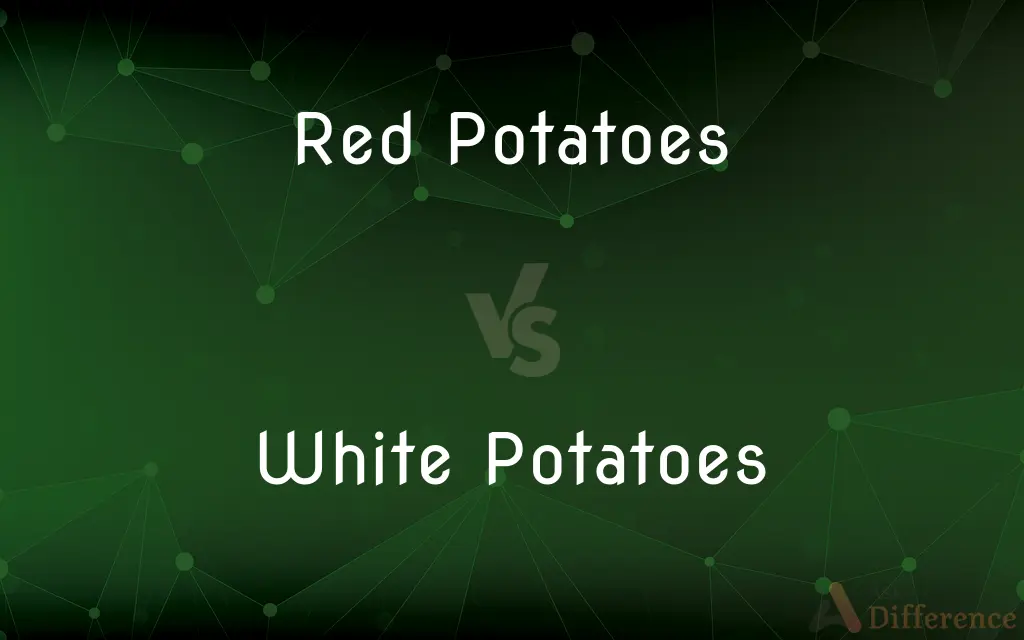Red Potatoes vs. White Potatoes — What's the Difference?
By Tayyaba Rehman — Published on December 13, 2023
Red potatoes have a waxy texture and red skin, while white potatoes are starchier with white or yellow skin.

Difference Between Red Potatoes and White Potatoes
Table of Contents
ADVERTISEMENT
Key Differences
Red Potatoes are known for their red skin and firm, waxy texture. They hold their shape well during cooking, making them ideal for salads and roasting.
White Potatoes, with their white or yellow skin, have a more starchy and fluffy texture. They are versatile and often used for baking, mashing, and frying.
The skin of Red Potatoes is thinner and often left on in dishes for added color and texture. They have a subtly sweet, earthy flavor.
In contrast, the thicker skin of White Potatoes is usually peeled off. Their flavor is more neutral, making them a good canvas for various seasonings.
Red Potatoes are lower in starch and higher in moisture compared to White Potatoes. This affects their cooking properties and suitability for different recipes.
ADVERTISEMENT
Comparison Chart
Skin Color
Red
White or Yellow
Texture
Waxy and Firm
Starchy and Fluffy
Usage
Salads, Roasting
Baking, Mashing, Frying
Skin Thickness
Thin
Thick
Flavor
Subtly Sweet, Earthy
Neutral
Compare with Definitions
Red Potatoes
Firm, moisture-rich potatoes ideal for roasting.
Roasted red potatoes complement grilled steak.
White Potatoes
Potatoes with a fluffy texture, ideal for baking.
Baked white potatoes are a dinner staple.
Red Potatoes
Earthy, slightly sweet potatoes used in hearty dishes.
Use red potatoes for a robust stew.
White Potatoes
Potatoes with white or yellow skin, high in starch.
White potatoes make fluffy mashed potatoes.
Red Potatoes
Low-starch potatoes with thin skin.
I prefer red potatoes for their thin, flavorful skin.
White Potatoes
Neutral-flavored potatoes that absorb seasonings well.
Season the white potatoes generously for flavor.
Red Potatoes
Potatoes that hold their shape during cooking.
Red potatoes keep their form in soups.
White Potatoes
Versatile potatoes often used for frying.
White potatoes are perfect for making French fries.
Red Potatoes
Potatoes with red skin and a waxy texture.
Red potatoes are perfect for your potato salad.
White Potatoes
Potatoes with thicker skin, usually peeled.
Peel the white potatoes before boiling.
Common Curiosities
Do Red Potatoes cook faster than White Potatoes?
Generally, yes, due to their lower starch content and waxy texture.
Are Red Potatoes sweeter than White Potatoes?
Yes, Red Potatoes have a subtly sweet, earthy flavor.
Which potato is better for health, Red or White?
Both are healthy, but Red Potatoes have slightly higher moisture and lower starch.
Can you use White Potatoes instead of Red in salads?
It's possible, but Red Potatoes hold their shape better in salads.
Can White Potatoes be used for frying?
Yes, their starchiness makes them ideal for frying.
Which potato variety is more versatile, Red or White?
White Potatoes are more versatile due to their neutral flavor and texture.
Is the flavor of White Potatoes strong?
No, they have a more neutral flavor, making them suitable for various seasonings.
Can White Potatoes be used in soups?
Yes, but they may not hold their shape as well as Red Potatoes.
Which is better for mashing, Red or White Potatoes?
White Potatoes, due to their fluffy, starchy texture.
What distinguishes Red Potatoes from White Potatoes?
Red Potatoes have red skin and a waxy texture; White Potatoes have white or yellow skin and are starchier.
Are the skins of Red Potatoes edible?
Yes, the skins are thin and often left on in dishes.
Do Red Potatoes need to be peeled before cooking?
Not necessarily, their thin skin is often left on.
Are Red Potatoes good for roasting?
Yes, they hold their shape well and develop a crispy exterior.
Can both Red and White Potatoes be used in the same dish?
Yes, combining them can add variety in texture and flavor.
Are Red Potatoes suitable for baking?
They can be, but White Potatoes are usually preferred for baking.
Share Your Discovery

Previous Comparison
DNA Viruses vs. RNA Viruses
Next Comparison
Miele Oven vs. Neff OvenAuthor Spotlight
Written by
Tayyaba RehmanTayyaba Rehman is a distinguished writer, currently serving as a primary contributor to askdifference.com. As a researcher in semantics and etymology, Tayyaba's passion for the complexity of languages and their distinctions has found a perfect home on the platform. Tayyaba delves into the intricacies of language, distinguishing between commonly confused words and phrases, thereby providing clarity for readers worldwide.












































